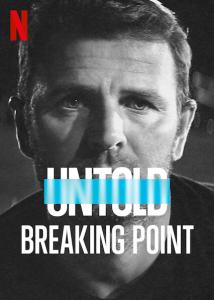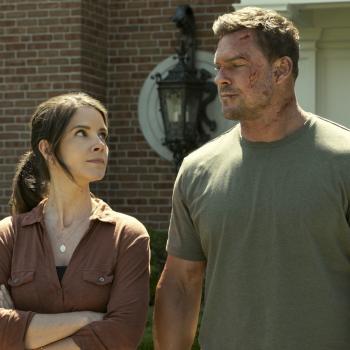
If it’s not clear by now, I’m not much of a follower of the sports of any kind. So it’s probably not surprising that I’d never heard of Mardy Fish and his rise through the ranks of American tennis. Fortunately, there’s the last episode of the Netflix series Untold, appropriately titled “Breaking Point” (other episodes reviewed here).
This is also much more of a normal documentary, where the series gets away from its hyper focus and gives us something of a broader picture of what’s in play. I don’t know that they intended to do this, given that the episode focuses exclusively on Mardy Fish and Andy Roddick, and emphasizes a discussion of mental health. And yet, we get much more background to the sport itself both nationally and internationally than we do in each of the other episodes in the series. We’re told about how America had dominated tennis under people like Andre Agassi (whom I admittedly did not know was an American) until the arrival of Roger Federer (who is apparently not an American? again: I don’t do the sports). So there was all kinds of pressure on the skilled American tennis players to keep our place in the world. Because we have a place in the world of tennis, which I didn’t know about. (Seriously, isn’t tennis a rich English-person thing? Don’t they play Wimbledon in London or something, while wearing ridiculously oversized hats?)
In previous episodes much of the focus was on the relationship between trauma/suffering and greatness in one’s sport. In Mardy Fish we have a tennis player who, at least so far as is presented in the show, did not particularly suffer in childhood or at the beginning of his career. True, he was pushed into the pursuit of tennis–partly by his own family and mostly by his adoptive family, the Roddicks–but not with the same zeal and passion with which Andy Roddick was pushed. But then again, neither was he at the top of his field. He was a perfectly capable tennis player, but not a great one.
Then he decided to go all-out for the sport. With a radical training regimen he got into fantastic physical shape and practiced religiously in preparation for the upcoming… season? I guess? (Is it a tennis ‘season’? Isn’t every season ‘tennis season’?) With his new attitude he powered his way to the top of the American tennis ranks and began to challenge those highest ranked figures in the world. Along the way, he began to suffer from what would eventually be diagnosed as heart arrhythmia and anxiety disorder. (Which came first and drives the other is unclear.) Minutes before a major match Fish withdrew from the event and apparently from singles tennis completely. But he also has been very open about his struggles and wants to help others who struggle with the same thing to the best of his ability.
As with all of the other shows, there’s a lot here I’m not competent to comment on. I’m not that kind of doctor, so I can’t say anything about Fish’s mental or physical issues. And I don’t pay much attention to sports (clearly), so I can’t even do a side-by-side comparison between the responses to Fish and the responses to Simone Biles withdrawing from Olympic events this summer. (I have no doubt that race and gender are factors in the various responses, but since I don’t know what the responses were I can’t speak to exactly how.) But someone else should, since there are pretty clear parallels here.
I can, however, point out something about us and how we ought to respond to the Netflix series as a whole. In each of these stories, we’re given close looks at specific moments in the lives of public figures. Mostly these moments involve pain, trauma, or violence. I think Netflix is trying to do some social good by trying to highlight social and cultural issues in the broader society and in sports specifically, while giving individuals a platform to present their side of complex stories. (And to be fair, in many of these episodes–not all, but many–Netflix did try to give us multiple sides of a story if at all possible.) So I think Netflix is trying to do some good, and this is commendable. But I also have to wonder how much of the suffering we see in this series would have been if not avoided, at least minimized if something good (athletics) had not been elevated by our society to such inappropriate heights? If there were only modest amounts of money involved, if you only received local respect, if sports was seen as ‘just another job’, well, humans are sinful and we can wreck anything. But there is something in the scale here that makes the wrecks more catastrophic than they would otherwise have to be.
Which leaves us as Christians in that difficult place of having to figure out what to do. I don’t think the right answer is either not to watch Netflix or not to enjoy sports. But the right answer might be to do each of those things less. Invest less time and money and attention on them not just because it’s good for us (though it is also good for us), but because it might very well be better and healthier for those who participate.
Dr. Coyle Neal is co-host of the City of Man Podcast and an Associate Professor of Political Science at Southwest Baptist University in Bolivar, MO













